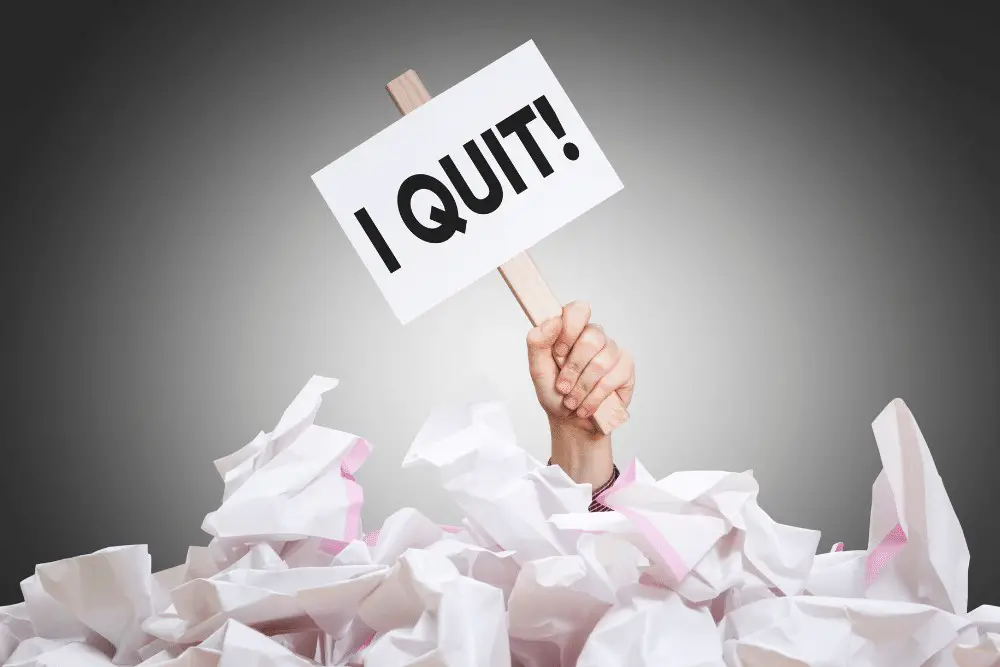Are you thinking about quitting piano lessons?
Do you want to make sure you don’t burn any bridges as you quit?
I’m a music teacher for over 10 years, and I’ve also taught piano lessons to many students (young and old).
Some of them have stuck with me for years, and some quit fairly quickly.
I don’t take it personally, but if you want to quit, there is a right way and a wrong way to go about it.
In this article, I’ll walk you through some considerations you may have and options you may want to try.
Table of Contents
How To Quit Piano Lessons
Whether you’re low on time, money, or desire, don’t quit piano without considering why. If you do quit piano, be honest with your piano teacher and respectful while thanking them for their time and working with you. After quitting, don’t give up playing the piano; keep practicing through other means at your own pace.
Should I Quit Piano Lessons?
There are many reasons you may want to quit piano, but some are better than others.
Before you do quit, make sure you consider your reasons and if it’s enough.
Many times, a piano teacher won’t take you back after you quit for fear you’ll quit again.
Consider these common reasons I see people quit piano and some possible solutions to your problems.
Bored With Piano
You may think that you don’t like the piano anymore or you’re bored with it.
In my experience, the fact of the matter is you’re not “bored” you’re bored with the material you’re playing.
Maybe you thought you’d be playing Piano Man in a matter of weeks, but the truth is, if you’re bored, it can be fixed.
Consider asking your piano teacher for more songs to play or for input on the songs you practice.
Maybe look for an online learning tool with hundreds of songs out, such as Flowkey, to help you stay motivated on top of the instruction you’re already getting.
Try this first. If you’re still bored or don’t like it after learning to play songs you like, then go ahead and quit your music lessons.
Costs Too Much
The cost of weekly lessons is one of the reasons I completely understand.
We, music teachers, have to make a living or get paid fairly for these music lessons too, and as we get more qualifications and have more students waiting for a chance to take lessons, we need to raise our fee.
We don’t want to turn people away because of money, but the highest quality of piano instructors have the right to charge what they want. It’s a business for them.
If you’re struggling to swallow the bill every week or month, consider a couple of options before quitting.
First, talk to your instructor. Ask if they have any assistance programs or if they’d be willing to go to every-other-week music lessons or once per month.
Some may not be willing to, and that’s their right. But it’s also your right to look elsewhere in this case.
Shop around for other piano teachers if you need to, but keep in mind, anywhere from $15-45 for a half-hour or $25-100 per hour are fair terms.
If it’s still not possible, go ahead and quit. But keep playing as much as you can and consider a more affordable online learning tool.
I’ll plug it again; Flowkey is a good option and the one I recommend.
Takes Up Too Much Time
Learning piano is an investment in time. You won’t pick it up quickly.
Even without lessons, you’ll still need to invest some practice time to improve, and the more consistently you invest your time, the better.
If you don’t have the time to practice, maybe you shouldn’t invest in the lessons.
But I find piano students usually have plenty of time if they look at their schedules and block off small practice chunks 4-5 days per week.
Planning it ahead of time helps.
Not Happy With Progress
There are times with every single pianist when you’ll be unhappy with your progress.
You think:
I’m not getting any better.
Why aren’t I improving?
I stink, and this is as good as I’ll get.
I’m just not cut out for the piano.
My friend, from the greatest player ever to the person who plunked their first key, we all feel this way.
But for newer players (those most likely to quit), you don’t have the experience and history to know it gets better.
If you’re not happy with your progress, try talking with your teacher. Ask them how well you’re improving.
They may be astounded by how quickly you’re learning.
Or they may be frustrated too.
Ask for ideas on how to get better more quickly.
Don’t let this be the reason you quit. You’ll regret it because you’ll give into the mindset that you can’t do it.
And that is completely false.
Everyone can do it!
Does that surprise you?
It just takes time, effort, and the right learning tools.
Learning piano is a long-term goal.
It’s not a matter of days or weeks. Progress comes with months.
Don’t Get Along With The Teacher
OK. This one I get.
If you don’t like your piano teacher because of a personality conflict, the truth is, there’s not usually a lot to do.
Check yourself first and see if you’re being respectful and giving learning the piano your best shot.
If not, they may be tough on you because you’re letting them down.
But if it’s not that, it may just be a conflict, and there’s nothing wrong with them or you.
You may try talking to them about how you feel like you’re not getting along. Sometimes, piano teachers don’t realize how they come across.
But if this doesn’t work, it’s OK to quit. You don’t need to put yourself in an unhappy situation.
But then, I don’t want you to give up on the piano.
Go find another teacher!
How Do I Quit Piano?
I touched on it earlier, but I’ll say it again. If you have to quit, do it the right way.
It often hurts our feelings when our students quit, but if you’ve been honest and tried the above solutions, we’ll understand.
- Be honest. State your reason clearly.
- Thank them for the time they spent working with you.
- Give them a nice card or recommendation.
- Do it in person, not over the phone calls or text.
- Let them know well before your lesson is supposed to happen.
- Let them know the week or two before you plan on quitting.
Don’t forget: we do this because we love teaching piano. Piano teaching is a choice we made.
Quitting Piano Lessons Doesn’t Have To Mean Quitting Piano
Every single time I have a student leave, I give the same statement:
Quitting piano lessons doesn’t have to mean quitting piano.
Whatever the reason, as a piano teacher, I want my students to keep going.
Most often, this means they’ll need to pick up some of the best piano books for their level.
But I strongly encourage you to also check out some online learning options.
Now, there are a lot out there, and a lot of them are junk.
But Flowkey isn’t one of them.
Even the students I keep, I encourage them to join the program.
They have access to helpful courses and learning tools, but they also have thousands of songs broken down to help you learn.
I don’t give my recommendations lightly, but this is one you should check out.
Final Thoughts
I hope you don’t quit the piano even if you quit piano lessons.
But if you’re going to, now you know what to consider and what your options are.
Piano is an awesome instrument and one that brings a lot of joy and meaning to the world.
You can be a part of that!

